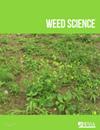Using Soybean Chaff Lining to Manage Waterhemp (Amaranthus tuberculatus) in a Soybean–Corn Rotation
IF 2.1
2区 农林科学
Q2 AGRONOMY
引用次数: 0
Abstract
Abstract Waterhemp (Amaranthus tuberculatus [Moq.] Sauer) escapes are common in midwestern U.S. soybean [Glycine max (L.) Merr.] fields due to the continued rise in herbicide-resistant (HR) populations. In a conventional harvesting system, weed seeds are harvested with the crop grain and spread back on to the field. Harvest weed seed control methods such as chaff lining concentrate weed seed-bearing crop and weed chaff into a narrow row (chaff line). These chaff lines (30- to 50-cm wide) are undisturbed the following growing seasons, under the assumption that the chaff line creates an environment less favorable for weed seed germination and survival. Field experiments were conducted in a soybean–corn (Zea mays L.) rotation in 2020 and 2021 in Ames, IA, and Roland, IA, to quantify the effectiveness of chaff lining for managing A. tuberculatus seeds. About 70% of the A. tuberculatus seeds were retained on the mother plant at soybean harvest in 2020. The chaff lining system concentrated more than 99% of the A. tuberculatus seeds exiting the combine into the chaff line. Although A. tuberculatus population density in 2021 was 76% higher inside the chaff line than outside the chaff line, A. tuberculatus aboveground biomass was 63% lower inside the chaff line than outside the chaff line at 12 wk after corn planting. Similarly, A. tuberculatus inside the chaff line had delayed emergence compared with A. tuberculatus outside the chaff line. Application of preemergence herbicides in corn inside the chaff line delayed A. tuberculatus emergence by more than 2 wk compared with A. tuberculatus outside the chaff line. Additionally, a follow-up postemergence herbicide application in corn was needed only inside the chaff line to manage A. tuberculatus, suggesting the possibility of lower overall herbicide use. These results support implementing chaff lining in soybean-based crop systems of the U.S. Midwest to help manage HR A. tuberculatus seedbanks.大豆-玉米轮作中利用大豆秸秆衬里治理水大麻
摘要由于抗除草剂(HR)种群的持续增加,水大麻(Amaranthus tuberculatus[Moq.]Sauer)在美国中西部大豆[Glycine max(L.)Merr.]田地中很常见。在传统的收割系统中,杂草种子与作物谷物一起收割,然后撒回田里。收割杂草种子控制方法,如谷壳内衬,将杂草种子作物和杂草谷壳浓缩成窄排(谷壳线)。这些颖壳线(30至50厘米宽)在接下来的生长季节不受干扰,假设颖壳线创造了一个不利于杂草种子发芽和存活的环境。2020年和2021年,在爱荷华州埃姆斯和爱荷华州罗兰的大豆-玉米轮作中进行了田间试验,以量化谷壳内衬对管理结核分枝杆菌种子的有效性。2020年大豆收获时,约70%的结核分枝杆菌种子保留在母株上。谷壳内衬系统将99%以上离开联合收割机的结核分枝杆菌种子集中到谷壳生产线上。尽管2021年结核A.tuberculatus种群密度在糠线内比糠线外高76%,但在玉米种植后12周,糠线内结核A.tuber地上生物量比糠线下低63%。同样,与谷壳系外的结核分枝杆菌相比,谷壳系内的结核分枝菌出现延迟。在谷壳系内玉米中施用发芽前除草剂,与谷壳系外的结核分枝杆菌相比,将结核分枝杆菌的出现延迟了2周以上。此外,只需要在谷壳系内对玉米进行出苗后除草剂的后续施用,就可以管理结核分枝杆菌,这表明除草剂的总体使用量可能会降低。这些结果支持在美国中西部的大豆作物系统中实施谷壳内衬,以帮助管理结核分枝杆菌种子库。
本文章由计算机程序翻译,如有差异,请以英文原文为准。
求助全文
约1分钟内获得全文
求助全文
来源期刊

Weed Science
农林科学-农艺学
CiteScore
4.60
自引率
12.00%
发文量
64
审稿时长
12-24 weeks
期刊介绍:
Weed Science publishes original research and scholarship in the form of peer-reviewed articles focused on fundamental research directly related to all aspects of weed science in agricultural systems. Topics for Weed Science include:
- the biology and ecology of weeds in agricultural, forestry, aquatic, turf, recreational, rights-of-way and other settings, genetics of weeds
- herbicide resistance, chemistry, biochemistry, physiology and molecular action of herbicides and plant growth regulators used to manage undesirable vegetation
- ecology of cropping and other agricultural systems as they relate to weed management
- biological and ecological aspects of weed control tools including biological agents, and herbicide resistant crops
- effect of weed management on soil, air and water.
 求助内容:
求助内容: 应助结果提醒方式:
应助结果提醒方式:


